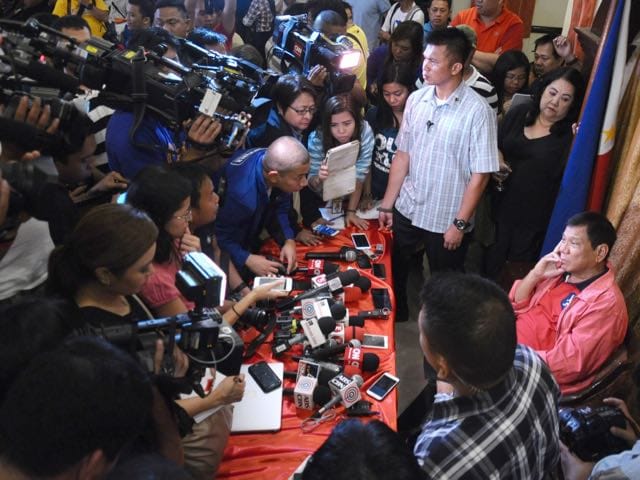CMFR takes exception to President-elect Rodrigo Duterte's recent statement that most of the journalists who have been killed in the Philippines for their work were slain because they're corrupt.
This statement was originally published on cmfr-phil.org on 1 June 2016.
CMFR takes exception to President-elect Rodrigo Duterte’s statement, made during his May 31st press conference in Davao City, that most of the journalists who have been killed in the Philippines for their work were slain because they’re corrupt.
While corruption is undoubtedly a continuing problem in the press and media, journalists have been killed for other reasons, among them for exposing corruption in government, as in the case of Tacurong City journalist Marlene Esperat, or for their advocacy in behalf of environmental protection, as in the case of Puerto Princesa’s Gerardo “Gerry” Ortega. Some have also been killed for exposing anomalies in local governments as well as for fighting criminality. A 2006 CMFR study in fact found that an overwhelming number of those killed since 1986 were exposing corruption and criminal syndicates in the communities. Because a significant number of those accused of killing journalists are local officials, as well as police and military personnel, the killings also suggest that the slain had been successful in exposing official wrongdoing and collusion with criminal groups.
Nevertheless, CMFR has never discounted the possibility that some of the journalists killed since 1986 were corrupt, or had been irresponsible. But we have always held that no one deserves to be killed for either offense, and that, if a journalist has offended the subject of his reports or commentary, the latter has a number of options for redress, among them bringing the offense to the attention of the media organization concerned, the Kapisanan ng mga Brodkaster ng Pilipinas (KBP) or the Press Councils, or, as legal resort, the filing of a libel complaint before the courts. Since the KBP and the Press Council are hounded with failed responses, we have to acknowledge libel as a legitimate recourse even though we object to its criminalization.
President-elect Duterte was correct in saying that irresponsible, biased, paid-for reporting and comment do lead to a journalist’s being killed. But the killing of anyone is nevertheless still a crime, and it doesn’t matter whether the victim is a journalist or not. Everyone, including journalists, is entitled to, and deserves the protection of the State. Far from suggesting that nothing can be done about the killing of journalists, we have made policy recommendations that could help to stop such violence, steps which call on law enforcement agencies to do a better job of protecting citizens and which could help to end the culture of impunity.
Although he has said in some instances that some of his statements are said in jest, it did not seem that he was joking in this instance. CMFR hopes that the President-elect’s statements are not interpreted by those who would silence journalists for whatever reason – whether they feel they have been abused by the media, or whether they have something to hide from the public – as a license to kill journalists.
Was he still speaking as Mayor of Davao City, thinking only of the particular case of Jun Pala about which he has strong opinions? As President of the Philippines, Mayor Duterte would hopefully be more circumspect. The killing of journalists is after all not something to be made light of, having earned the attention and condemnation not only of advocate organizations in the Philippines, but also of international press freedom watch groups, the United Nations and the European Community.
CMFR has established that 152 journalists have been killed in the line of duty since 1986. This number is a stain on our claim as a democratic society and exposes our boast about press freedom in the country as a sham. Despite some of its practitioners’ admitted flaws, the killing of journalists cannot be dismissed simply as something that cannot be helped.
A democratically elected president must value the free press as essential to the democratic system that has elected him. Rodrigo Duterte, freely elected by the people, whose campaign relied on the free press to report his candidacy owes the Philippine press more than just this glib response.



